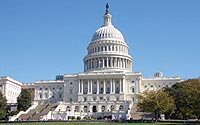 Lawmakers on Thursday expressed reservations about a plan by the Internet Corporation for Assigned Names and Numbers to expand the universe of domain names
by allowing companies to register brand names or generic words as top-level domains.
Lawmakers on Thursday expressed reservations about a plan by the Internet Corporation for Assigned Names and Numbers to expand the universe of domain names
by allowing companies to register brand names or generic words as top-level domains.
“If ICANN is determined to move forward, it should do so slowly and
cautiously,” Sen. Jay Rockefeller (D-W.Va.), chairman of the Commerce Committee, said at a hearing about the plan. “The potential for fraud, consumer confusion and cybersquatting is
massive and argues for a phased in implementation.”
Sen. Kelly Ayotte (R-N.H.) also urged caution, arguing that the expansion will make it harder for law
enforcement to determine who is behind unlawful sites. The House of Representatives has scheduled a hearing on the plan for next week.
Despite the attention on
Capitol Hill, Congress doesn't appear to have the ability to stop ICANN from forging ahead with its plan to offer new top-level domains. A top-level domain is the string of letters to the right of the
last dot in the URL. ICANN, a nonprofit created in 1998, intends to accept applications between Jan. 12 and April 12 of next year.
Registering a new top-level domain
will cost at least $185,000, and operating it will cost $25,000 a year.
The Association of National Advertisers opposes ICANN's plan, arguing that companies would
have to feel obligated to purchase top-level names defensively, in order to prevent their purchase by rivals or detractors. Companies with trademarked names have the ability to stop their names from
appearing in URLs, but even those companies could end up paying large sums to police cybersquatters.
Kurt Pritz, senior vice president at ICANN, said Thursday
that the organization didn't expect more than 1,000 applications for the domain names, but added that ICANN had no way of predicting the exact number. “A lot of companies that are planning for
this are keeping their plans close to the vest,” he said in response to questions by Sen. Amy Klobuchar (D-Wash.).
Pritz also said that ICANN has procedures to
deal with disputes over domain names and trademark infringement claims.
Dan Jaffe, ANA executive vice president of government relations, criticized the
“reckless plan,” arguing that it poses a “serious threat to the legitimate interests of both companies and consumers on the Internet.”
Esther
Dyson, founding chairman of ICANN's board, also weighed in against the plan. She said that she initially supported the concept of new top-level domains, believing that it would broaden the market and
encourage innovation. But Dyson said she changed her mind upon learning how expensive it would be to obtain a new top-level domain.
“Most of the new domains
would simply add friction,” Dyson said in her written statement, adding that the beneficiaries were likely to be “Google, trademark lawyers” and registrars.
She elaborated in her testimony on Thursday that companies like Twitter or Amazon were able to innovate without a change to the domain name system. “What i would like
to see is real innovation, where you don't buy a name for $200,000 and then spend a few million defending it, but where you actually create something new,” she said.